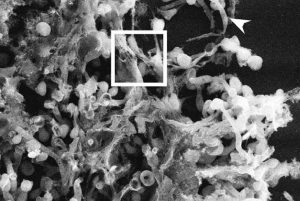Daily Research Library
Inflammation is a common indication of many health conditions, but calculating how the underlying biology of inflammation contributes to specific diseases has been very difficult. For the first time, a team of researchers at UNC School of Medicine now report the development of a new technology to identify white blood cells called neutrophils that are primed to eject inflammatory DNA into the circulation via a process called NETosis. The findings are published in Scientific Reports. The study marks the first time scientists have used machine learning tools for rapid quantitative and qualitative cell analysis in basic science.”



When foreign invaders such as viruses or bacteria enter our bodies, white blood cells rush in to fight the invaders in various ways. One type of white cell, the neutrophil, expels its DNA into the bloodstream to trap bacteria and viruses and aid in their killing to prevent infections. This neutrophil DNA has a net-like appearance called Neutrophil Extracellular Traps, or NERTs. The process by which this DNA is thrust into the extracellular space is called NETosis. These so-called DNA NETs are reported to contribute to inflammation in numerous diseases such as autoimmune disease, sepsis, arthritis, cancer, sickle cell disease, and thrombosis.

Different chemical stimuli can activate NETosis to the eye; the final NETosis neutrophil looks the same. To help distinguish neutrophils activated by different stimuli and in a very rapid manner, the Parise laboratory leaned on machine learning, a branch of artificial intelligence built on the idea that computers can acquire knowledge through data and observations without explicit programming. The computers can then learn to generalize from examples and make predictions.
Read more, “UNC Researchers Develop Machine Learning Algorithm to Detect Inflammation” at this link.
Daily Research Library, Health – Medical Devices, December 5, 2019, news courtesy of Stanley Perrigo, a Microbiology Graduate from John Hopkins University.
